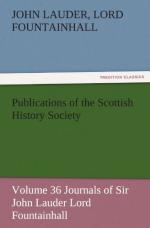had accepted it, Edinburgh and Aberdeen and all the
chief burghs —Glasgow being the sole
outstanding one. At last, however, Glasgow, on
thinking over the thing, agreed, and the consequence
was that in April 1652 the Act incorporating Scotland
with the English Commonwealth passed the first and
second readings in the Long Parliament. From April
1652 Scotland was, they might say, united with England,
and in the Protectorate Parliaments, in Cromwell’s
first and second Parliaments, there were thirty
members from Scotland sitting at Westminster with the
English members, and so through the protectorate
of his son Richard, and it was not till the Restoration
that there came the rebound. Then the order
universally was: ‘As you were,’ and
a period of Scottish history was sponged out, so
much so that they had forgotten it, and many of them
rather regretted it. At all events, it was a
very important period of Scottish history, and the
proposed publication will give us flashes of light
into the feelings and the state of the country between
1652 and 1660.
Proceeding, Professor MASSON said the Society had kept strictly to their announcements, and they had already contributed a great many publications, which, at all events, had proved, and were proving, new materials for the history of Scotland, giving new conceptions of that history. They would observe in the first place how the publications had been dotted in respect of dates, some of them comparatively recent, others going far back. They would observe, in the second place, that the documents had been of almost all kinds—all those kinds that were of historical value; all those that really pertained to the history of Scotland—that was to say, the history of that little community which, with a small population, they named Scotland. There were various theories and conceptions of history. The main and common and the capital conception of the day was to give the story of the succession of events of all kinds. In that respect Scottish history, though the history of a small nation, would compete in interest with the history of any nation that had ever been. Small, but the variety, the intensity of the life, the changes, the vicissitudes, the picturesque incidents, no history could compete for that kind of interest with the history of that little torrent that had flowed through such a rocky, narrow bed. Crimes or illegalities got easily into books, and this was a little unfortunate, because people dwelt on such crimes and illegalities as constituting history. But they did not. No more would the digest of the trials of their Police Courts and of their chief Courts. They figured, of course, in history, but there ought to be a caution against allowing too great a proportion of those records of crimes and illegalities to affect their views. Then there was a notion of history very much in favour with their scholars at present, that it should consist merely of a narrative of the actions of the Government




